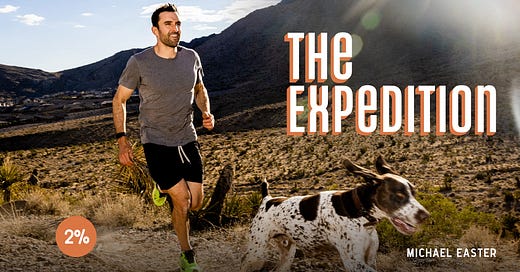The most useful stuff I’ve discovered exploring the world and the internet this month.
We’ll cover: Endurance tips, nutrition misinformation, the sugar/obesity paradox, two important mental health stories, a great podcast and TV show, etc.
Notes:
The full version of this premium post is for Members, who are people who want to have fun and not die.
If you’d like to access all 2% premium content/have fun and not die, please consider becoming a Member below. To paraphrase PBS, “This program was made possible by readers like you.”
Also, an important question: Did you or did you not Burn the Ships today? The workout is adaptable to any ability level, and the goal is simple: finish better than you started.
Onto today’s post: The Expedition
This series is a journey into thoughts, opinions, ideas, observations, studies, facts, figures, etc. Good ones, bad ones, insightful ones, dumb ones, and ones you can use to live better.
It’s a roundup of all the worthwhile stuff I’ve encountered in the last month. It’s a bit of an island of misfit toys. But, hey, the greatest journeys are winding. We’re covering:
An endurance book I read.
Data on nutrition misinformation, the sugar/obesity disconnect, metabolism, four-day workweeks, and cancer prevention.
Two stories that changed how I think about mental health.
Ancient killing tools.
A great podcast episode on nutrition.
The best episode of television I’ve seen in a long time.
And more.
Enjoy …
A book I read: Training for the Uphill Athlete
This book is billed as “an authoritative but accessible training manual for athletes and coaches who feel most alive in the mountains or pushing the uphill ascent.” Think: A hardcore manual for trail running, ski mountaineering, etc.
The big takeaway: If you want to seriously improve your endurance, spend more time in the low and slow zones. As much as 90 percent of your training should be in Zones 1 and 2 (easy).
A good way to ensure you’re not going too hard: You should be able to breathe entirely through your nose while exercising. (Breathing through your nose isn’t magic; it just acts as a governor on your effort).
By the numbers
4,000 to 127,000
That’s the estimated number of annual premature deaths caused by nutrition misinformation each year. This is mainly from people being directed into fringe diets to “cure” their medical issues.
Here’s a deep dive into the topic.
Your move: Eating a wide variety of whole foods is a smart hedge.
15 and 20
Fifteen is the percent decrease in sugar consumption in the US since year the 2000. Twenty is the percent increase in our obesity rate.
This suggests that sugar didn’t cause the obesity epidemic, as some claim. Instead, it’s likely eating more calories generally, possibly along with less activity.






